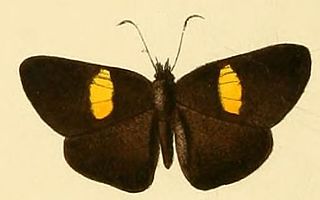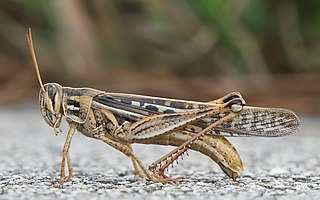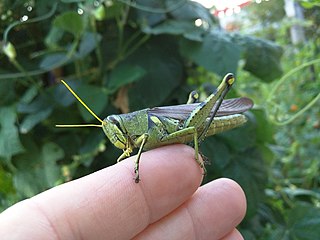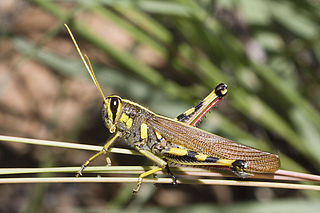
The desert locust is a species of locust, a periodically swarming, short-horned grasshopper in the family Acrididae. They are found primarily in the deserts and dry areas of northern and eastern Africa, Arabia, and southwest Asia. During population surge years, they may extend north into parts of Southern Europe, south into Eastern Africa, and east in northern India. The desert locust shows periodic changes in its body form and can change in response to environmental conditions, over several generations, from a solitary, shorter-winged, highly fecund, non-migratory form to a gregarious, long-winged, and migratory phase in which they may travel long distances into new areas. In some years, they may thus form locust plagues, invading new areas, where they may consume all vegetation including crops, and at other times, they may live unnoticed in small numbers.

Perizoma flavofasciata, the sandy carpet or sandy rivulet, is a moth of the family Geometridae. The species was first described by Carl Peter Thunberg in 1792. It is found in most of Europe and northern Africa and east across the Palearctic to the Urals and the Altai Mountains. The species prefers meadow valleys, floodplains, waterside areas, bushy meadows and gardens. In the Alps it rises to 1500 metres.

Schistocerca is a genus of grasshoppers, commonly called bird grasshoppers, many of which swarm as locusts. The best known species is probably the desert locust and trans-Atlantic flight may explain the biogeography of some locust species.

Metarhizium acridum is the new name given to a group of fungal isolates that are known to be virulent and specific to the Acrididea (grasshoppers). Previously, this species has had variety status in Metarhizium anisopliae ; before that, reference had been made to M. flavoviride or Metarhizium sp. describing an "apparently homologous and distinctive group" of isolates that were most virulent against Schistocerca gregaria in early screening bioassays.

Myurella flavofasciata is a species of sea snail, a marine gastropod mollusk in the family Terebridae, the auger snails.
Schistocerca camerata is a grasshopper species in the genus Schistocerca.

Potamanaxas flavofasciata, the yellowbanded skipper, is a butterfly in the family Hesperiidae. It is found in Ecuador, Peru and Bolivia.

Schistocerca americana is a species of grasshopper in the family Acrididae known commonly as the American grasshopper and American bird grasshopper. It is native to North America, where it occurs in the eastern United States, Mexico, and the Bahamas. Occasional, localized outbreaks of this grasshopper occur, and it is often referred to as a locust, though it lacks the true swarming form of its congener, the desert locust.

Schistocerca alutacea, the leather-colored bird grasshopper, is a species of grasshopper in the family Acrididae. The species occurs in the United States, from Massachusetts to Arizona and Florida.

The Cyrtacanthacridinae are a subfamily of Orthoptera: Caelifera in the family Acrididae. They are sometimes referred-to as bird locusts, criquets voyageurs in French-speaking Africa, and Knarrschrecken in German.

Schistocerca albolineata, the white-lined bird grasshopper, is a species of bird grasshopper in the family Acrididae. It is found in North America, often near the U.S.-Mexico border.

Schistocerca rubiginosa, the rusty bird grasshopper, is a species of bird grasshopper in the family Acrididae. It is found in North America and South America.
Tripudia flavofasciata is a species of moth in the family Noctuidae. It is found in North America.

Schistocerca shoshone, known generally as the green bird grasshopper or green valley grasshopper, is a species of bird grasshopper in the family Acrididae. It is found in North America.

Schistocerca lineata, known generally as the spotted bird grasshopper or birdwing grasshopper, is a species of bird grasshopper in the family Acrididae. It is found in North America.

Schistocerca damnifica, known generally as the mischievous bird grasshopper or Carolina locust, is a species of bird grasshopper in the family Acrididae. It is found in North America.

Schistocerca piceifrons is a large locust in the subfamily Cyrtacanthacridinae: Acrididae. There are two subspecies. S. p. piceifrons is sometimes called the Central American locust and S. p. peruviana is sometimes known as the Peruvian locust.
Episcapha is a genus of beetles belonging to the family Salpingidae.
Philopator is a genus of moths belonging to the family Zygaenidae.

Schistocerca cohni is a species of bird grasshopper in the family Acrididae. It is found in Mexico.
















